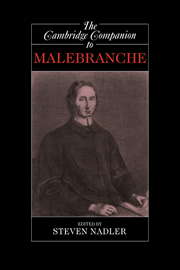Book contents
- Frontmatter
- Introduction
- 1 Malebranche and Method
- 2 Malebranche on the Soul
- 3 Malebranche on Ideas and the Vision in God
- 4 The Malebranche-Arnauld Debate
- 5 Malebranche on Causation
- 6 Metaphysics and Philosophy
- 7 Malebranche's Theodicy
- 8 Malebranche on Human Freedom
- 9 Malebranche's Moral Philosophy
- 10 The Critical Reception of Malebranche, from His Own Time to the End of the Eighteenth Century
- 11 Malebranche's Life and Legacy
- Bibliography
- Index
4 - The Malebranche-Arnauld Debate
Published online by Cambridge University Press: 28 May 2006
- Frontmatter
- Introduction
- 1 Malebranche and Method
- 2 Malebranche on the Soul
- 3 Malebranche on Ideas and the Vision in God
- 4 The Malebranche-Arnauld Debate
- 5 Malebranche on Causation
- 6 Metaphysics and Philosophy
- 7 Malebranche's Theodicy
- 8 Malebranche on Human Freedom
- 9 Malebranche's Moral Philosophy
- 10 The Critical Reception of Malebranche, from His Own Time to the End of the Eighteenth Century
- 11 Malebranche's Life and Legacy
- Bibliography
- Index
Summary
PRESENTATION
From 1683 to 1694, a long and furious polemic took place between Malebranche and Antoine Arnauld. When the debate began, Malebranche was still a “young” philosopher (The Search After Truth was published in 1674), identified by the public as one of the leading lights of the new generation of Cartesians. Antoine Arnauld (1612- 1694), on the other hand, was an “old” thinker, known mainly for his theological (rather than philosophical) writings. These can be divided into two general periods: from 1640 to 1668, Arnauld was one of the principal protagonists of the battles over efficacious grace that took place after the publication of Jansenius's Augustinus, appearing as the leader of the “Jansenist” camp. After the “Peace of the Church” in 1668, Arnauld devoted himself essentially to the campaign against the Protestants, in collaboration with Pierre Nicole. Philosophically, Arnauld had written very little: the Fourth Objections to Descartes' Meditations in 1641, and the Grammar of 1660 and the Logic of 1662 - both called de Port-Royal, the first in collaboration with Claude Lancelot, the second with Pierre Nicole. All three of these texts had earned him a well-established reputation as a Cartesian. Thus, the ideological proximity of Arnauld and Malebranche defined and delimited the domain of their confrontation. They were both Catholic priests and both referred constantly to Descartes and St. Augustine.
- Type
- Chapter
- Information
- The Cambridge Companion to Malebranche , pp. 87 - 111Publisher: Cambridge University PressPrint publication year: 2000
- 9
- Cited by



